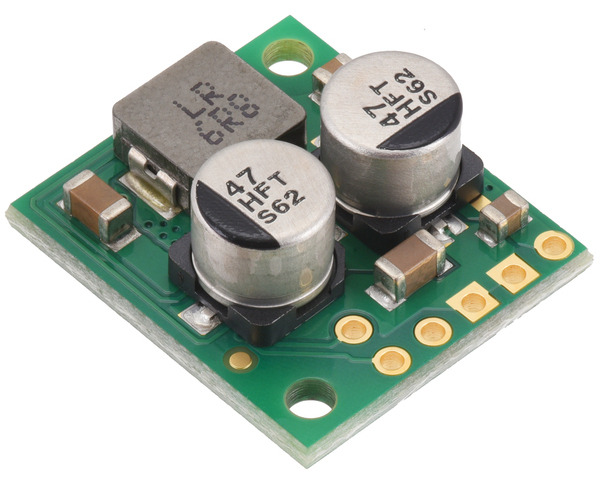Step-Down (Buck) Voltage Regulators » D30V3x Step-Down Voltage Regulators » D30V30Fx Step-Down Voltage Regulators »
15V, 2.7A Step-Down Voltage Regulator D30V30F15
| Output voltage | Typical max output current1 | Input voltage range2 |
|---|---|---|
| 15 V | 2.7 A | 15 V – 45 V |
Note 1: Typical continuous output current at 30 V in. Actual achievable continuous output current is a function of input voltage and is limited by thermal dissipation. See the output current graphs on the product pages for more information.
Note 2: Minimum input voltage is subject to dropout voltage considerations; see the dropout voltage section of product pages for more information.
Alternatives available with variations in these parameter(s): output type Select variant…
 Compare all products in D30V30Fx Step-Down Voltage Regulators.
Compare all products in D30V30Fx Step-Down Voltage Regulators.
| Description | Specs (11) | Pictures (12) | Resources (3) | FAQs (0) | On the blog (0) | Distributors (49) |
|---|
Dimensions
| Size: | 0.7″ × 0.8″ × 0.35″1 |
|---|---|
| Weight: | 3.3 g1 |
General specifications
| Minimum operating voltage: | 15 V2 |
|---|---|
| Maximum operating voltage: | 45 V |
| Continuous output current: | 2.7 A3 |
| Output voltage: | 15 V |
| Reverse voltage protection?: | Y4 |
| Maximum quiescent current: | 16 mA5 |
| Output type: | fixed 15V |
Identifying markings
| PCB dev codes: | reg32a |
|---|---|
| Other PCB markings: | 0J14242 |
Notes:
- 1
- Without included optional headers.
- 2
- Subject to dropout voltage considerations. See the dropout voltage graph under the description tab for more information.
- 3
- Typical maximum continuous output current at 30 V in. Actual achievable continuous output current is a function of input voltage and is limited by thermal dissipation. See the output current graph under the description tab for more information.
- 4
- To -40 V. Connecting supplies over 40 V in reverse can damage the device.
- 5
- While enabled with no load. The maximum quiescent current occurs at lower input voltages. It is reduced to under 1 mA with higher inputs or when the regulator is disabled via the enable pin. See the quiescent current graph under the description tab for more information.






























